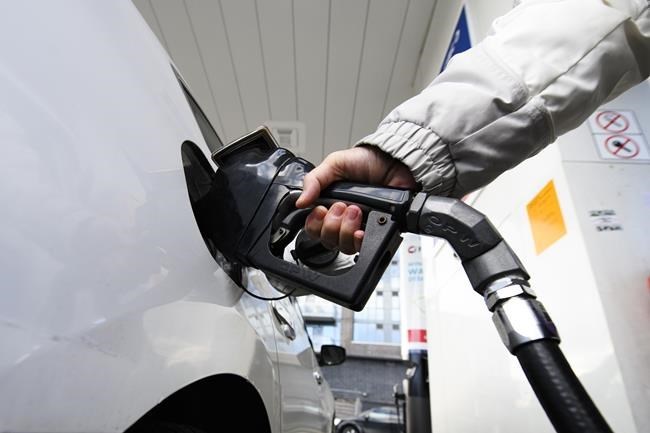OTTAWA — Quarterly payments to offset the cost of the carbon price will now be called the "Canada Carbon Rebate," federal ministers said Wednesday as they moved to rebrand their signature climate policy amid slumping support.
The Liberals have acknowledged for months that they haven't communicated effectively with Canadians about how carbon pricing and the rebate system work. An Abacus poll in January found fewer than half the people eligible to receive a rebate believed they actually did.
The government should use plain language when they talk about the policy, said Labour Minister Seamus O'Regan. Few people used the old name — the "Climate Action Incentive" — but do use words like carbon and rebate, he said.
"And if we can speak that language, that's important so people understand what's going on here."
The Liberals want Canadians to view the carbon price as an affordability aid rather than a "carbon tax" that costs them more money. The parliamentary budget officer has concluded about eight in 10 people get more from the rebates than they pay in carbon price, with lower-income families benefiting the most.
That's possible because in addition to individual consumers, the carbon levy is paid by small and medium-sized businesses without large emissions. Big industry has a separate system.
The Conservatives and their leader, Pierre Poilievre, have since made "axe the tax" the centrepiece of their pre-election campaign efforts. In the 17 months since Poilievre took over as leader, Conservatives have pushed motions nine separate times to get the House of Commons to vote against the policy.
They haven't succeeded with other parties but they are gaining traction with Canadians, with Poilievre's party leaving the Liberals in their polling dust. The Abacus poll found that among people who voted Liberal in 2021, more than one in 10 won't do so again, specifically because of the carbon price.
Poilievre insists the carbon price is contributing to inflation, particularly on food costs.
"Life has become unaffordable because Trudeau has placed a punitive carbon tax on the essentials that Canadians need to survive," his party said in a news release Wednesday.
Environment Minister Steven Guilbeault disputes that. Last fall, Bank of Canada Gov. Tiff Macklem said carbon pricing had a negligible impact on inflation in 2023 and even less in 2022, Guilbeault said.
But he also admits Canadians don't quite get how it all works, and his department is working on changing that, including with Wednesday's name change.
"What I'm hoping that people will remember from what we're doing today is the fact that this is helping Canadians, and Canadians who need it the most," he said. "And I think granted, the previous name was a bit difficult to understand and even for many people to remember, this will likely make it easier."
Keith Stewart, a senior energy strategist at Greenpeace Canada, said the rebrand is more than necessary.
"I'm glad they're giving it a name that accurately describes what it is, because I didn't know what the 'Climate Action Incentive Payment' was — and I work on climate policy for a living," he said.
Stewart said he's hopeful if Canadians understand the policy more they will be less susceptible to misinformation about it.
Alberta's premier joined the federal Conservatives in criticizing the rebrand Wednesday, calling it a "cynical and desperate ploy."
"No 'rebrand' will save the federal government from its dwindling poll numbers," Danielle Smith said in a joint statement with provincial Environment Minister Rebecca Schulz.
The carbon price has not been the only communication struggle for the Liberals of late. On Wednesday, Guilbeault spent the day clarifying comments he made Monday in French at a public transit conference in Montreal.
Guilbeault told the conference that the federal government was not going to invest in new road projects because the existing road network is adequate to meet the needs of Canadians. He said investments in public transit and active transportation will be made.
The statement prompted blowback from the Conservatives and provincial premiers. Ontario Premier Doug Ford even launched a fundraising email over it.
Pressed to explain, Guilbeault said he should have been more clear that he was referring to major new road projects like the "third link" tunnel to connect Quebec City with the neighbouring city of Levis across the St. Lawrence River.
Guilbeault said he did not mean the government would no longer invest in maintaining or improving Canadian roads.
The government announced the new name as they published the annual rebate amounts that will begin April 1 to coincide with the annual increase to the carbon price. That cost per tonne will increase by $15 to $85, adding 3.3 cents to the price of every litre of gasoline and 2.9 cents on a cubic metre of natural gas.
Most families will see a bigger rebate as a result — $64 more every three months in Alberta, and $36 more in Ontario, Manitoba and Saskatchewan.
But the move to lift carbon pricing from heating oil for three years, along with overpayments last year, means people in all Atlantic provinces except New Brunswick will see their quarterly payment shrink between $20 and $42. New Brunswick households will see a smaller increase of $6 every three months.
On an annual basis the rebates range from $760 in New Brunswick to $1,800 in Alberta. Rural residents, who typically have to drive longer distances for daily needs, are getting a 20 per cent top up to that, ranging from an additional $152 in rural New Brunswick to another $360 in rural Alberta.
This report by The Canadian Press was first published Feb. 14, 2024.
Mia Rabson, The Canadian Press




